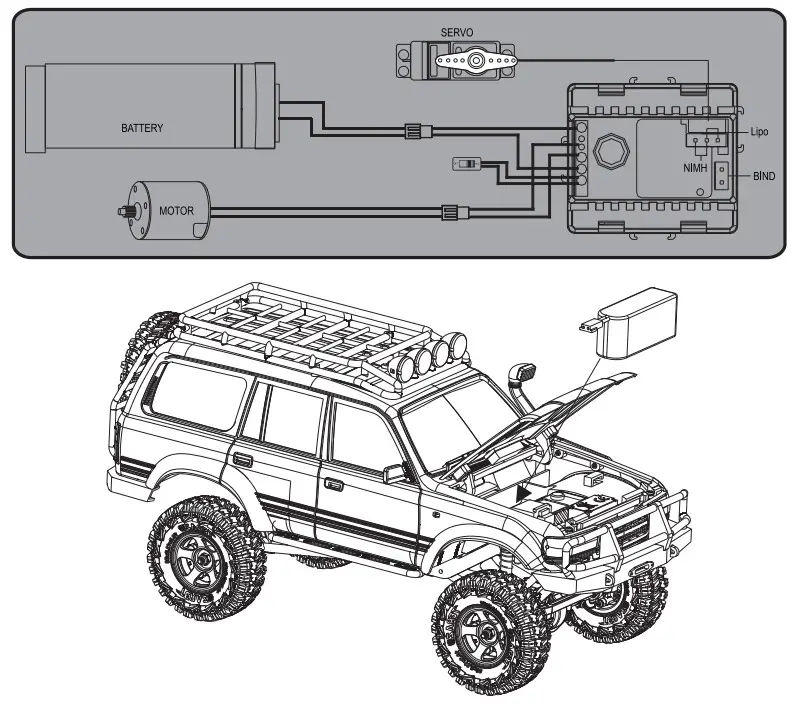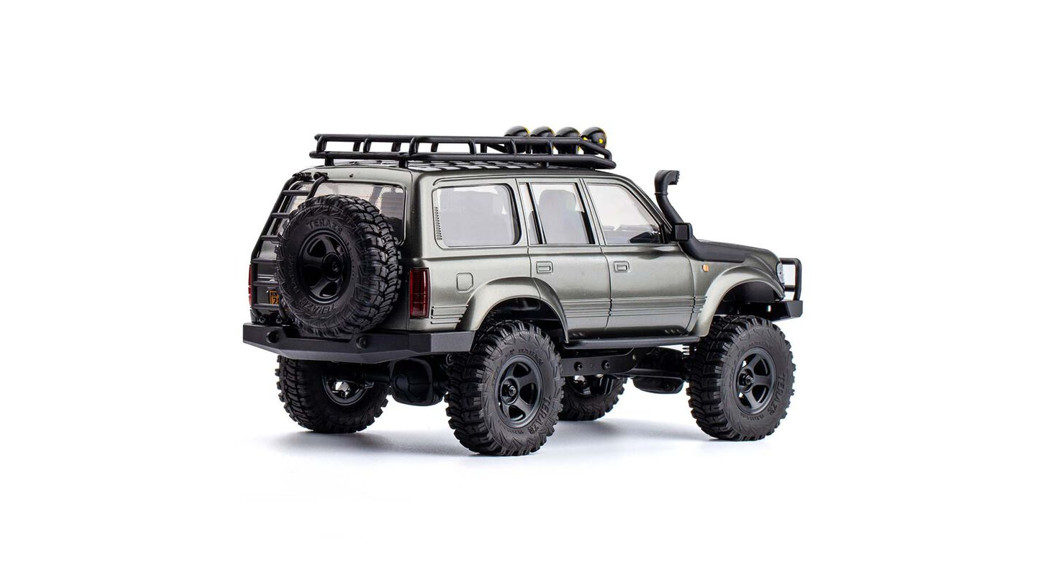
Instruction Manual
Function


- Remove the battery compartment cover.
- Replace the used batteries with new MA size batteries.
Install the Batteries
- Push the trigger forward to slow down or break.
- Pull the trigger back to accelerate.
![]() Please replace batteries when the power indicator blinks or the buzzer beeps.
Please replace batteries when the power indicator blinks or the buzzer beeps.
 Keep the transmitter and receiver 40cm apart when operating.Throttle trim: If the value Inches forward or backward without throttle input, adjust the trim to set the neutral throttle position. Steering trim: If the vehicle veers left or right without any steering input. tee the steering tram to adjust the steering servo me the vehicle tracks straight.Operating procedureAlways turn the transmitter on before turning on the vehicle. Always disconnect the vehicle BEFORE turning off the transmitter.
Keep the transmitter and receiver 40cm apart when operating.Throttle trim: If the value Inches forward or backward without throttle input, adjust the trim to set the neutral throttle position. Steering trim: If the vehicle veers left or right without any steering input. tee the steering tram to adjust the steering servo me the vehicle tracks straight.Operating procedureAlways turn the transmitter on before turning on the vehicle. Always disconnect the vehicle BEFORE turning off the transmitter.
This device complies with part 15 of the FCC Rules. Operation is subject to the condition that this device does not cause harmful interference (1) this device may not cause harmful interference, and (2) this device must accept any interference received, including interference that may cause undesired operation.Any changes or modifications not expressly approved by the party responsible for compliance could void the user’s authority to operate the equipment.NOTE: This equipment has been tested and found to comply with the limits for a Class B digital device, pursuant to Part 15 of the FCC Rules. These limits are designed to provide reasonable protection against harmful interference in a residential installation.This equipment generates, uses and can radiate radio frequency energy and, if not installed and used in accordance with the instructions, may cause harmful interference to radio communications. However, there is no guarantee that interference will not occur in a particular installation.If this equipment does cause harmful interference to radio or television reception, which can be determined by turning the equipment off and on, the user is encouraged to try to correct the interference by one or more of the following measures:— Reorient or relocate the receiving antenna.— Increase the separation between the equipment and receiver.— Connect the equipment into an outlet on a circuit different from that to which the receiver is connected.— Consult the dealer or an experienced radio/TV technician for help.The device has been evaluated to meet general RF exposure requirements. The device can be used in portable exposure conditions without restriction.FCC ID: 2ARE7-91803
14+ CAUTION: This product is intended for ages 14+ users under 18 years of age who require parental supervision.
Looking for a mini scaler that’s dependable, detailed, and confident on any terrain?Introducing the Toyota LC80 Land Cruiser.From the period-correct lights and functioning indicators to vents on the vehicle body, the Land Cruiser was designed to static-model standards. Even the interior is painstakingly recreated in 1:18 scale.A feature-packed trail-proven chassis drives the Land Cruiser. Aluminum rails provide a rigid platform while a multilink geometry with Panhard bar chassis design allows for maximum axle articulation. Power is delivered from the super high-torque gearbox to ultra-grippy Beadlock tires via nylon driveshafts.Water-resistant 2S 7.4V electronics consists of an independent servo, 2-in-1 receiver/ESC, 050 motor, and 7.4V 600mAh battery; Allowing for a high power-to-weight ratio and all-weather operations.If you want the best-looking, best-performing 1:18 scaler on the market, look no further than the Land Cruiser LC80!
Warnings
- This vehicle is not intended for those under 14 years of age without proper adult supervision. It is not a toy! Failure to operate or maintain this vehicle in a safe manner can result in bodily harm.
- Replace damaged components with original factory parts. Pay special attention to the polarity of all vehicle
- Only use approved 2 cell lithium polymer batteries. Do not over-charge or over-discharge the battery as doing so may cause the battery to become a fire hazard If the battery should become hot during charging, discontinue charging immediately and disconnect the battery from the charger. Never leave the battery unattended while charging. If you are unsure of how to charge this battery, please seek the advice of experienced RC users. Never let children charge the battery without adult supervision.
- The motor will become hot during use. Allow 10-15 minutes between runs for the vehicle to cool down. Doing so will prolong the life of your vehicle.
- Use common sense when selecting the environment to operate your vehicle. Do not operate near power cables, cellular/radio towers, deep water or unstable terrain. The operator is solely responsible for their actions.
- The product is composed of precision electrical components. It is critical to keep the product away from moisture and other contaminants. If exposed to a humid environment, make sure the electronics are fully dried prior to using them again.
- Always check the radio range of the vehicle prior to operation in order to prevent radio loss or interference.
- Operate this product within your ability. If the vehicle is dangerous to retrieve, it’s never worth the risk.
- Always turn on the transmitter before connecting the battery on the model. When turning off the model, always disconnect the battery first, and then turn off the model, always disconnect the battery first, and then turn off the If this order is reversed, the model may become uncontrollable and cause serious damage.
- Never allow transmitter batteries to run low as it may cause loss of vehicle control.
- Plastics on the vehicle are susceptible to damage or deformation due to extreme heat and cold climate. Do not store the model near any source of heat such as an oven or heater. Store the model indoors, in a climate-controlled, room temperature environment.
- Never shorten the receiver antenna; this may affect the transmitting range of the radio system.
Setting the Gear Mesh
The gear mesh is the clearance between the pinion and spur gears in your vehicle. If the motor or gearing components are replaced. check that the gears are not meshing too tightly as this may cause premature wear.

Charging the Battery
- Connect the charger to a USB port then connect the battery to the charger.
- When charging, the Green LED is flash, when charged, the Green LED is stable.
- Do not let the battery charge unattended!
- If the battery or charger is hot, disconnect the battery and charger immediately as this may be caused by an intimal short circuit.

Lithium Polymer (LiPo) Battery Warning
- Never charge a lithium polymer battery with a charger designed for Nicd, NIMH, or any other type of battery Use ONLY a charger designed for a LiPo battery.
- Do not leave LiPo battery unattended during charging.
- Do not overcharge the battery.
- Always charge LiPo batteries on non-flammable, heat-resistant surfaces.
- Always use a LiPo-safe bag or container while charging. Do not allow LiPo cells to overheat at any time. Cells that reach greater than 140 Fahrenheit(60°C) will usually become damaged and will catch fire.
- Do not charge the LiPo pack while it is still in the model. Never charge or store battery packs in a vehicle.
- Do not discharge LiPo: doing so will damage the battery.
- Do not expose LiPo cells to water or moisture at any time.
- Do not store battery near open flame or heater.
- Do not assemble LiPo cells or pre-assembled packs together with other LiPo cells or packs.
- Always store LiPo batteries in a secure location away from children.
- Always remove the LiPo battery if the model is involved in any kind of crash.
- Carefully inspect the battery and connectors for even the smallest damage.
- CAUTION: Cells may become hot after usage. Allow the pack to cool to room temperature prior to recharging.
- Do not allow the electrolyte to get into the eyes Or on the skin. Wash affected areas immediately if they come into contact with electrolytes. Do not alter or modify connectors or wires of a LiPo battery pack.
- Always inspect the condition of the battery before charging and operating.
- Do not short circuit the LiPo battery.
- Do not have contact with a leaky/damaged battery directly.
- Do not charge the battery out of recommended temperature range(0°C-45°C).


- If it is not in use for a long time, unplug and take off the battery to prevent battery leakage
- Do not open, disassemble, or attempt to repair the battery.
Spare parts list
| C2049 | 1:18 050 Motor set |
| C2050 | 1:18 2.4G Transmitter |
| C2023 | 1:18 10A ESC/RX Combo |
| C2021 | 1:18 1kg Servo |
| C2047 | 1:18 2.4G Transmitter Receiver Set |
| C2051 | 1:18 USB 2S LIPO Charger cable |
| C2052 | LIPO Battery 2S 380mAh |
| C2053 | LAND CRUISER LC80 Hood |
| C2036 | LAND CRUISER LC80 Front and Rear Light Cup Set |
| C2037 | LAND CRUISER LC80 Hood Mount Set |
| C2038 | LAND CRUISER LC80 Rooftop Rack |
| C2039 | LAND CRUISER LC80 Ladder And Spare Tire Bracket |
| C2040 | LAND CRUISER LC80 Spotlight Cup Set |
| C2041 | LAND CRUISER LC80 Rearview Mirror And Wiper |
[xyz-ips snippet=”download-snippet”]

